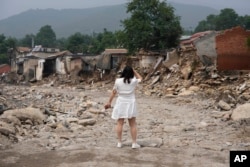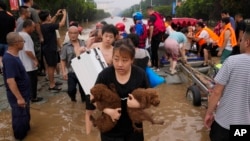This month’s destructive flooding in Beijing and surrounding provinces is expected to take a toll on China’s already sputtering economy, leaving financially strapped local and regional governments struggling for resources to repair the damage.
Analysts say the failure of various flood-control measures has also struck a blow to the nation’s reputation as an infrastructure superpower capable of girding the world with high-quality railroads, highways and ports.
The full extent of the damage caused by flooding associated with Typhoons Doksuri and Kanu is difficult to assess because of late and incomplete reporting by local authorities, but by any measure it has been substantial.
Beijing authorities announced at a press conference Wednesday that 1.29 million city residents had been affected, with 59,000 houses destroyed and another 147,000 severely damaged. Thirty-three people died in Beijing, with 18 others missing.
The last available account from surrounding Hebei province on August 5 reported 10 dead, 18 missing and more than 1 million people affected. The direct economic loss was nearly $2.35 billion, according to statistics from the Flood Control and Drought Relief Headquarters in Baoding, the provincial capital.
Zhuozhou, Bazhou and other places in Hebei province, as well as hard-hit Heilongjiang and Jilin provinces in the northeast, have not yet released data on the damage.
Analysts said that because of China's tendency to underreport the extent of damage in such situations, the actual losses could be many times higher than the official figures.
At a meeting of the State Council on August 8, Premier Li Qiang instructed all regions and departments to prioritize flood prevention, flood control and rescue work in order to "minimize casualties … and ensure the basic life of the affected people," according to the official Xinhua News Agency.
However, there was no mention of how much money the Central Committee of the Communist Party of China intends to spend for reconstruction.
According to the website of the Ministry of Finance, it and the Ministry of Agriculture and Rural Affairs urgently allocated roughly $101 million in "agricultural production disaster prevention and relief funds" on August 8 to support affected provinces and areas.
The Ministry of Finance and the Ministry of Water Resources announced on August 4 that they would urgently issue $62.2 million of "central fiscal water conservancy disaster relief funds" to support the repair of damaged dams and other water conservancy facilities in the three provinces and cities of Beijing, Tianjin and Hebei.
But those sums fall far short of the billions of dollars of losses caused by the flooding, said He-Ling Shi, associate professor at the Department of Economics at Monash University in Melbourne, Australia.
"It's not because the Chinese government doesn't want to invest in relief and reconstruction. It's because it doesn't have the money," Shi said.
He said before the flooding, Hebei, Heilongjian and other hard-hit areas already had to borrow money to survive. The Chinese digital newspaper The Paper reported that Hebei province had issued local bonds totaling about $14.18 billion, the highest in the country, based on data disclosed by ChinaBond.com.cn in February.
Shi told VOA it shows the central and local governments have been financially drained by the draconian Zero-COVID policy in the past three years.
Even since those measures were lifted, the expected post-pandemic economic recovery has faltered.
According to data released by the General Administration of Customs of China on August 8, exports fell by 14.5% year-on-year in July, the largest drop since February 2020 in the early days of the pandemic. Imports fell by 12.4% year-on-year.
The Manufacturing Purchasing Managers Index for July announced by the National Bureau of Statistics was only 49.3%, which was below the 50% line for the fourth consecutive month.
Shi said the flooding would further slow China's recovery, delaying the reconstruction of homes and businesses. That in turn could reduce the purchasing power of Chinese consumers, further holding back the recovery.
Analysts said that the impact of the flooding may spill over to the global economy.
Shi cited the once-vibrant China-Australia trading relationship as an example. Australia's top three export items to China are iron ore, coal and education, but if infrastructure construction slows in China, demand for iron ore and coal will fall.
Similarly, an economic contraction will make it more difficult for Chinese families to send their children to universities in Australia, where they once accounted for more than 80% of international students. That figure is already below 50%.
Kuo-Chen Sung, a research fellow at the Institute of International Relations at National Chengchi University in Taiwan, said China's global economic and trade influence is also likely to suffer.
China once dominated the world as an "infrastructure monster," but that reputation was undermined when its most critical flood-control infrastructure projects failed amid flooding, Sung said.
Coupled with the fact that the nation’s recent weak import and export performance has dragged down the global economy, China may eventually lose its credibility with other nations, he said.
"The whole world has seen its ability to respond to disasters. It is very fragile,” Sung said. “And its sewage system is not sufficient. The whole world can see this. The Chinese Communist Party's ability to rule domestically and influence internationally is declining."
Wang Weiluo, a Germany-based renowned hydrology expert, pointed out that if money can be found for post-disaster reconstruction, that could have a stimulative effect on the economy.
But, he said, it remains to be seen whether the central government has the money to support reconstruction on the scale that is needed.
Adrianna Zhang contributed to this report.








